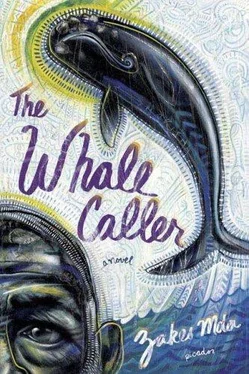When the time for sleeping comes she panics when she remembers that she has not brought her candle with her. She is now used to the electrified luxury of the Wendy house and has become too careless about darkness. There is a candle somewhere in her sequinned handbag, but she left the handbag at the Wendy house because she had not planned to sleep over. The girls’ parents agree to indulge her with a candle since she has helped their little girl so much. As soon as she gets into her bedding she feels something hard and rough touching her body. She screams when she discovers that she is sleeping on a snake. She jumps up, to great laughter from the girls. One of the girls reaches for the snake and dangles it in front of her.
“It’s only a rubber snake, auntie,” she says, still laughing.
“Never again play such tricks on me,” shouts Saluni. “Do you want me to die of a heart attack?”
“We don’t want you to die, auntie,” says the sick twin. “We love you.”
“Sorry, auntie,” says the other twin. “Sorry, auntie.”
When night falls and Saluni hasn’t returned the Whale Caller becomes jittery. He knows that she will not walk in the countryside in the dark. He blames himself for being insensitive to her neuroses. Perhaps that is why she had gone to the Bored Twins. Now, because of him, Saluni might have relapsed to the bottle. She might be spending the night singing rude songs with sailors and layabouts in the taverns of Hermanus. Worse still, she might have deserted him forever, and this sends a cold panic galloping in his guts. He is tempted to go and search for her, but decides against it when he realises that there are hundreds of taverns dotting the district. He would not know where to begin.
The night is too long. The bed that broke its virginity that breathless night of murder and thunder is lumpy and uncomfortable, asserting its own longing.
At dawn his body itches for a waltz, even though in winter there are no songs of the whales. If Saluni were here they would be dancing a cappella. After sunrise he decides to go to the mansion and find out if Saluni did go there. And if she did, he would like to know where she said she was going when she left the mansion. If she did not get to the Bored Twins at all, then she had lied to him. There must be another lover. When and how it happened he has no idea, as Saluni has been with him all the time these past few weeks. Since the first cleansing ritual they have been inseparable.
He has a general idea where the mansion is located. He remembers seeing it once or twice at a distance many years ago. He follows the road out of town in a westerly direction and trudges on until he sees the white building shimmering in the morning sun. From this distance its dilapidation is not noticeable. As he gets closer, the tulips that are blooming in the wild garden dazzle him with their wild colours. The flowers grow in clusters of deep purple, white, pink, yellow and red. Some petals combine different hues. There are red petals with yellow edges and violet petals with white edges. Saluni has told him the story of how the tulips were cultivated by the ostrich baron in the 1920s. He had inherited the bulbs from his forebears, who had in turn received them from the first in line — the son of the tulip baron who had long ago exiled himself to the Cape of Good Hope after the crash of the tulip market in Holland and the suicide of his father. The first in line had sailed with the bulbs to the Cape for sentimental reasons. He had no intention of starting a tulip business in the “new world,” but instead had secured himself clerical employment with the Dutch East India Company. He planted his bulbs in his little garden, and when his children — both those from his Dutch wife, and from Khoikhoi and Malay slave mistresses — were all grown up they dug out some of the bulbs and planted them in their little gardens. It happened like that over the generations, for almost three hundred years, until the time of the ostrich baron.
Tulips flower in spring, but these have developed erratic habits. They blossom any season they feel like blossoming, and they do it all at the same time, upstaging every other plant in the wild garden. And when they have decided to bloom, sometimes after hibernating for three years without a peep of colour from them, they are relentless. They spread all over the garden and are not deterred by the wild shrubs and grasses and the prickly pear and other cacti that otherwise reign supreme in the garden. But they never grow beyond what used to be the borders of the original ostrich baron’s garden.
The Whale Caller can hear shrieks of laughter from the garden. The voices have hollow reverberations like drops of water dripping from the roof of a cave into a rippling pool on the floor. He is overwhelmed by inexplicable elation. There is a strong scent of peace in the air despite the commotion that he can hear from around the corner. As he walks closer new odours assail him — the pungent smells of history coming in a whoosh from the broken windows of the mansion. The sweet and mouldy smell he knows so well comes floating gently to him, overpowering the variety of smells that permeate the air. And then he hears her voice: “I got it! Don’t let it get away!”
Saluni and the Bored Twins are having a wonderful time chasing goats. These animals occasionally invade the garden since they are partial to the cactus that grows on what used to be rockeries. Saluni has got a goat by the hind legs, letting its big udder dangle indecently. She lifts it up and one of the Bored Twins grabs a teat and squeezes the milk into her mouth. The goat is struggling and trying to escape and milk splatters all over her face. Saluni lets it go and runs to help the second twin, who is chasing another goat that has an even bigger udder. After a relentless chase they catch the goat, overpower it, and successfully milk it into the girl’s mouth.
The Whale Caller watches for a while. Saluni sees him leaning against the wall and shouts excitedly, “Come on, man. There is milk for you too.”
The Whale Caller hesitates a little. She beckons him once more and he joins the chase. He becomes the girls’ hero when he helps them catch and subdue the wildest of the animals. They cheer and applaud and go crazy over its teats. When they have had their fill they spray each other with the milk. He also has his turn suckling the warm milk. This is his first experience of goat milk and he finds the strange taste quite enjoyable. Then the girls spray him with the milk. Saluni watches all this with a big smile on her face.
“Let us not waste the milk,” the Whale Caller says, with streaks of milk mapping his face. “Remember that these goats have their kids to feed as well as providing the farmer with milk.”
“They are just wild goats,” says one of the twins. “They don’t belong to a farmer.”
“You don’t know that,” says Saluni.
“They belong to someone all right. That is why they don’t have their kids with them,” says the Whale Caller, letting the goat free and jumping out of its way. It kicks violently, throwing one of the twins to the ground. They all laugh at her. They help the fallen girl up and Saluni introduces them to the Whale Caller.
“A whale caller? What does a whale caller do?” asks the smaller twin.
“Is he your husband?” enquires the other one.
“Boyfriend! Remember Aunt Saluni told Mama that she was not married.”
“You ask silly questions,” says Saluni, brushing the dust from the Whale Caller with her hands.
“I came to fetch you, Saluni,” says the Whale Caller. “I waited for you for the whole night. I was worried about you, Saluni.”
“Why did you wait for her, Mr. Whale Caller?” asks the bigger twin. “Why were you worried about her when she was with us?”
Читать дальше












